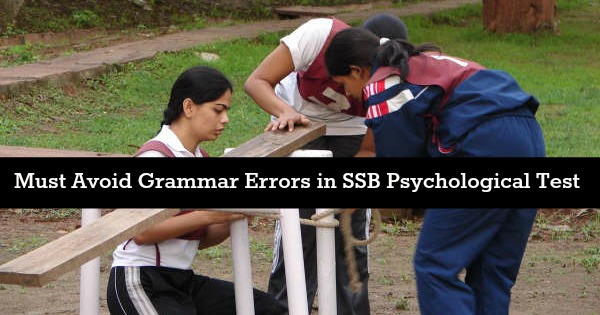Psychological Tests are conducted to check the response of the candidates on the usual conditions which they face on day-to-day life. It helps in recognizing the candidates various emotional and behavioural reactions on different degrees. Its an series of tests (WAT, TAT, SRT, SD) conducted one after another, its a written exam so candidates most frequently commits silly grammar mistakes which may become a headache for assessor if he cant understand your answer. In this article we are discussing Must Avoid Grammar Errors in SSB Psychological Test.
Must Avoid Grammar Errors in SSB Psychological Test
- Lack of subject-verb agreement: Subjects and verbs must agree in number.
- Examples: The dog barks when it is angry. [singular]
- Dogs barks when they are angry. [plural]
- Using the wrong pronoun:
- Incorrect: Everybody must write their own letter.
- Correct: Everybody must write his or her own letter.
- Incorrect use of apostrophes
- Examples: Its vs. It’s – Its branches were falling. It’s a cold day. They’re vs. Their – They’re ready to leave. They are on their way.
- Missing comma or semi-colon in a compound sentence:
- Correct: She wanted to go, but she didn’t have a car.
- Writing run-on sentences:
- Incorrect: Tom is very cute, he is very popular at school. Correct: Tom is very cute. He is very popular at school.
- Misuse of homophones:
- Examples: Accept vs. Except – Accept means to receive. Except means to take out or leave out. There vs. Their – They wanted to go there. Their mother was not home.
- Using wrong verb tense:
- Examples: For present tense – We walk to the store. For past tense – We walked to the store. For future tense – We will walk to the store
- Using who vs. whom:
- Examples: Who is a subject pronoun. Who is driving the car? Whom is an object pronoun. With whom are you going to the party?
- Using double negatives:
- Incorrect: She doesn’t have no idea of what to do next. Correct: She doesn’t know what to do next.
- Using few vs. less:
- Use “few” or “fewer” for things you count. Use “less” for things you measure. Example: She wore out fewer shoes because she walked less miles.



















Sir little grammer mistake hai
Dogs bark hoga na ke dogs barks.
Am i right????